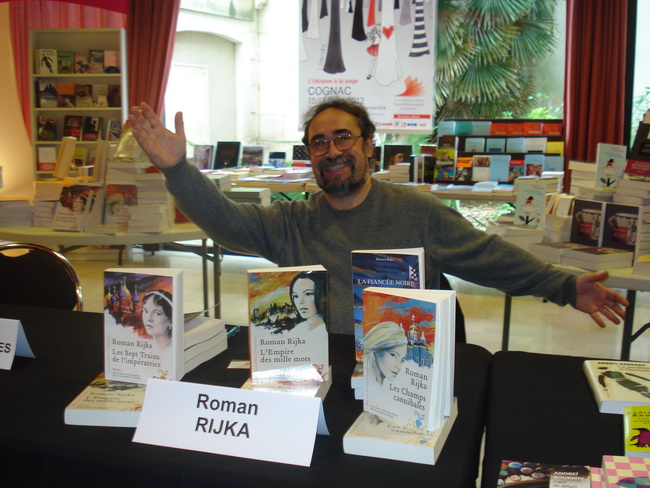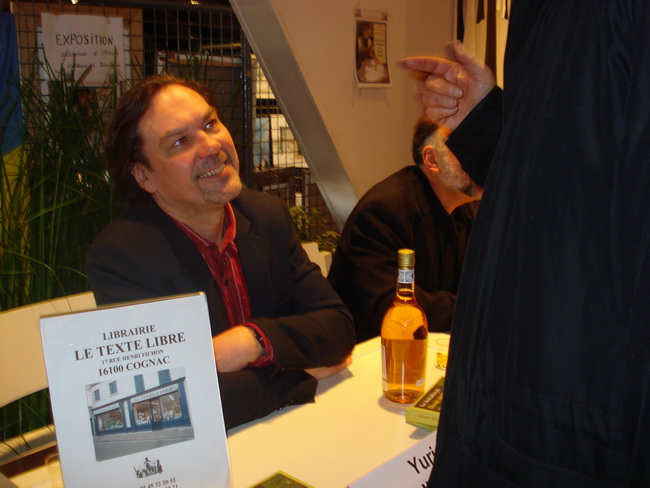“It was a challenge. We had to persuade a number of people before choosing Ukraine.” said festival Director Sophie Jullien. “Today, on the last day of the celebration I can say confidently: we made the right choice.”
Featuring a book salon and conference, film screenings, concerts, debates, and a sampling of Ukrainian food from writer Maria Matios, the festival conceptually aims to place a specific culture into a common European context. While last year’s guest of honour, Spain, and next year’s choice, Italy already belong to the European cultural space, Ukraine is quite different—both in terms of stereotypes within Ukraine and the attitudes of EU citizens toward Ukrainians.
COGNAC AND THE ARTS
The warm autumn sun was the biggest rival of Ukrainian writers at Littératures Européennes Cognac. “If it weren’t for this beautiful weather, many more people would have come”,organizers claimed, although the venue was well attended anyway. The festival had obviously become an integral part of the elegant old town long ago.

The small town of Cognac has a population of less than 20,000 but is known worldwide as the birthplace of the famous liquor that bears its name. Today, some top brands, such as Henessy, Martell, Rémi-Martin, Camus and Otard are produced in Cognac and distributed throughout the world. Its reliable financial background allows Cognac to fund numerous cultural initiatives, including Littératures Européennes Cognac.
Why focus on European literature? “Because, before becoming a political project, the European community had been a cultural one,” says Jean–François Colosimo, Chairman of the National Book Centre in France. “Because politician Jean Monnet who was one of the inspirers and fathers of the EU, was born here,” notes Cognac Mayor Michel Gourinchas. “Because visitors from European countries are a key element of the local economy,” explains Nicolas, an executive at one of the local cognac factories. Over the twenty years that the festival has been held, only two non-EU countries have had a chance to present their literature in Cognac: Ukraine and Norway.
INSECURE ABOUT FITTING IN
“Ukrainian literature is currently like a child prodigy that can do anything it likes,” said Yuri Andrukhovych at a conference. “After centuries of taboos, censorship and bans, we are enjoying unlimited freedom and feel wildly ecstatic about being allowed to do anything we want.”

“Why did you have to invite him?” an executive from a Ukrainian publishing house lamented quietly. “Literature means responsibility for the image of the country you represent before readers and the world.”
Whereas Ukrainians listened carefully to every word of their speakers to make sure that they would not have to denounce or justify anything later, the international audience was more benevolent. Most visitors were French from Cognac and the area who had known little about Ukraine before the festival, eager to gain an overall background and less attentive to small details.
The list of Ukrainian writers invited to the festival was determined by whether their books had ever been translated into French. These included novels by Andrey Kurkov, Yuriy Andrukhovych, Liubko Deresh, Maryna Levytska, Anna Shevchenko and Maryna and Serhiy Diachenko, all published in French. The international jury that voted on special prizes, as well as professional literary critics from France who moderated the conference had a chance to read them.
“I read books by all of the Ukrainian writers who attended the festival,” said Hubert Artus, French critic and writer. “You’re asking how well the themes and the quality fit European tastes and trends? Of course they fit in. In my opinion, Ukrainian literature is no better or worse than American, Mexican, Czech or any other literature. You have nothing to worry about. I work at this festival every year and I can assure you that this year the festival attracted as many people as it always has. For instance, we know Spain much better than Ukraine but people are equally interested in both countries. We just have much more Spanish literature available in French. That’s the only difference.”

According to Artus, “Ukrainians have nothing to worry about in terms of whether they fit into Europe. Ukraine is Europe by default because we all belong to a common European culture. The issues raised in Liubko Deresh’s Cult, for instance, are perfectly in line with youth literature trends popular in Europe. The French audience received its psychological tone very well, just as it does Andrey Kurkov with his political yet lyrical novels. Andrukhovych may be emotional at times, but he’s also very poetic, in my opinion.”
“Ukrainian discourse seems to be gradually rising,” said Raymond Clarinard of Courrier Internationalin a comment for The Ukrainian Week. “There is a critical mass of knowledge about Ukraine accumulating, and slowly, drop by drop, it is moving ahead. The dubious stereotypes fuelled by Ukraine’s opponents that used to mar anything related to the country are disappearing gradually, too. The fact that a place like Cognac with its prestige and variety of cultural initiatives has dedicated its festival of European literature to the introduction of Ukraine creates many new prospects for the nation. Let’s face it: some people had no idea that the country existed before Euro 2012. Today, they have a chance to discover that an entire world, an entire life lies behind the word ‘Ukraine’.”
Such were the first steps of Ukrainian contemporary literature in France. Some claimed that the festival “came too early” and organizers should have waited for more Ukrainian books to be translated into French. Others said that such events are essentially the only places where publishers, writers and translators can meet. New meetings encourage new projects. Perhaps they will encourage accomplishments and vibrant art initiatives in the future.
“It could have been better of course,” commented translator and literary history expert Iryna Dmytryshyn, Professor at the Paris Institut National des Langues et Civilisations Orientales (National Institute of Oriental Languages and Civilizations), who inspired Ukraine’s participation in the festival as the Guest of Honour. “But when you hear Ségolène Royal quoting Ukrainian writer Vasyl Barka, and Chair of the French National Book Centre quoting Voltaire to say that “Ukraine had always wanted freedom”, you no longer need to prove that Ukrainian culture is becoming an integral component of the common European legacy. We’ll know how effective the festival’s promotion is in a year or two, but this is precisely the right way to lay the groundwork for the promotion of a nation’s literature abroad.”

